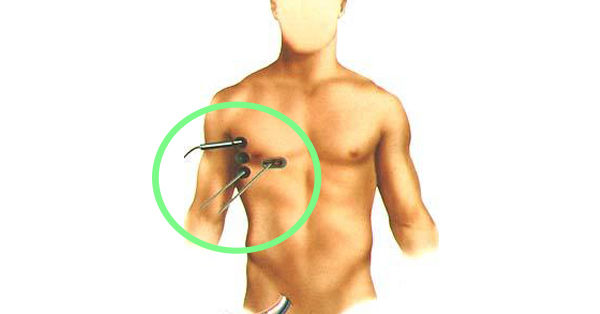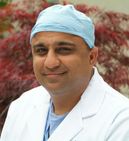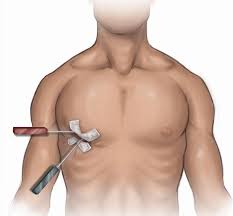“Are There Advantages to Heart Surgery Through The Ribs?” asks Dennis
By Adam Pick on April 16, 2018
We’ve learned together that there are several different approaches for surgeons and cardiologists to treat heart valve disease. There are open heart techniques and there are transcatehter approaches for heart valve replacement and repair. Specific to this spectrum of approaches, I received a great question from Dennis about minimally-invasive access through the ribs.
Dennis asked me, “Hi Adam, Does aortic valve replacement – through the rib cage – have any advantages or disadvantages versus open heart and/or TAVR? Thanks. Dennis”

To help Dennis, I reached out to Dr. Junaid Khan. So you know, Dr. Khan is a heart valve expert who has successfully treated many patients from our community at Alta Bates Summit Medical Center in Oakland, California. Dr. Khan has also been a tremendous supporter of our educational initiatives. Over the years, Dr. Khan has hosted patient events and filmed great videos with us.

Dr. Junaid Khan (Heart Surgeon)
Dr. Khan Says…
Here is Dr. Khan’s response to Dennis’ question about aortic valve replacement surgery through the rib cage:
Dr. Khan says, “That is a great question that I am very frequently asked. TAVR is the most minimally invasive approach for aortic valve replacement. TAVR is not considered “open heart”.
“As noted in recent news reports about Arnold Schwarzenegger, complications during transcatheter procedures can lead to emergent open heart surgery procedures. So, a surgical team is always on “stand-by” in the operating room. That team includes a heart surgeon and a cardiologist — as both are involved in the procedure. CMS (Medicare) and other insurance providers only approve TAVR for intermediate or high risk patients. In addition, patients with bicuspid aortic valves or infections are not candidates for TAVR. Patients with previous surgery are only approved for on a trial basis.

“The ‘Port Access’ technique, through the rib cage (shown above), is an open heart surgery for aortic valve replacement. Port Access is considered minimally invasive. This approach has the same risks associated with aortic valve replacement through a sternotomy (through the middle breast bone).
In our hands, the patient generally recovers faster and is back to their activities sooner. Port Access is applicable for most patients. I hope that helps! –Dr. Khan”
Many thanks to Dennis for his question and a special thanks to Dr. Khan for sharing his clinical research and experience with our patient community!
- See Dr. Khan’s Interactive Surgeon Profile
- Discover the Alta Bates Summit Heart Valve Microsite
- Watch Dr. Khan explain heart murmurs and leaky valves
Keep on tickin!
Adam
|
Barry Kanick says on April 18th, 2018 at 8:10 am |
|
I’ve read a variety of times that a Thoracic Surgeon limits his access & viewing area when utilizing a “minimally invasive” approach like this thus increasing the possibility of having a reoperation down the road.,,,Even at the Cleveland Clinic!!!,,,,So if the same risks apply to both type surgeries, why not advise the sternotomy approach which still seems to be tagged as the benchmark. ,,,,,Are you not possibly compromising the longevity of a successful valve replacement & it’s functionality due to the small port access approach whereas the focus seems to be on faster recovery & the patient getting back to work early. ,,,,,,,,,,just my 2 cents |
 |
|
Jenny says on April 18th, 2018 at 2:49 pm |
|
My husband recently died following surgery for a mitral valve replacement and the surgery was done through the ribs as he had had previous open heart surgery. A complication arose whereby he had a paravalvular leak that was jetting and this was left undiagnosed for 35 days despite his great difficultly breathing. He also developed an infection in a groin wound where a foreign material had been used to graft a vein. He died suddenly following a procedure to plug the paravalvular leak. I am waiting to hear what went wrong but would interested to hear from a third party thoughts on what he died from and wh |
 |
|
Tess says on April 18th, 2018 at 3:04 pm |
|
Barry, I only hear that from inexperienced surgeons when it comes to minimally invasive. Yes there are those surgeons that prefer the full sternum because that’s all they know. I’d like to see those articles as I have read the complete opposite. I had a minimally invasive at Mayo 18 months ago. Doing great the only complaint I have is that my incision still hurts sometimes although it is completely healed. Generally after a chest workout. I have heard that could last for years. (Dan) |
 |
|
Rob says on April 18th, 2018 at 3:56 pm |
|
I’m very sorry for your loss, Jenny. |
 |
|
Rob says on April 18th, 2018 at 3:58 pm |
|
In the year of testing, leading up to the eventual offer of open heart surgery, I fixated on wanting the minimally invasive. I’m so glad my incredible surgeon felt comfortable just doing the sternotomy and while under, found holes in my heart and other matters that would have compelled the traditional method anyway. That was June 2016. Grateful for every breath and all who helped me. I say go traditional for best results. |
 |
|
Mike Culpepper says on April 18th, 2018 at 5:33 pm |
|
I had the rib cage procedure (“Right Thoracotomy”) 4 1/2 years ago to repair my mitral valve. Zero complications and rapid recovery. Home from the hospital in 7 days. Was walking a mile in another week, up to 5 miles at a go by 5 weeks. Mine was performed at the Sana Cardio Institute in Stuttgart, Germany. Absolutely no pain, ever. Those guys were/are wizards. My surgeon was a pioneer in the procedure at Leipzig University, Germany, a number of years ago. |
 |
|
Bob Dye says on April 18th, 2018 at 7:41 pm |
|
After retiring at the end of 2013 at the young age of 57 and expecting a long life of fun and travel, I soon began experiencing severe edema in my lower legs, ankles and feet and was diagnosed with heart valve desease and a broken “floppy” mitral valve. I had the valve repaired – not replaced – in 2014 via a 2″ incision between a couple of my upper ribs, about 3″ from my right armpit. Surgery took less than three hours, and I was out of the hospital in five days, driving my car in two weeks, and released by my surgeon after only a month to begin enjoying my retirement in earnest (and feeling more like 57 than 77!). I have to say looking back that it all seemed so routine that it hardly registers as a blip in the long reel of my life, and even though I survived what is without question a life-threatening disease, I experienced no real epiphanies other than perhaps the realization that it’s better to have had such an event occur at the beginning of my retirement than to have had it prematurely end my retirement. Additionally, I’ll also state that having been repaired used Gortex string to reaffix my valve to its ventricle wall, I more than occasionally find myself thinking about camping! 😁 Having broken my sternum (and coccyx – ouch!) in a motorcycle accident in 1983, I was extremely averse to having my chest cut and split wide open, and am extremely grateful for the technological advances in these types of medical procedures and the dedicated surgeons who spent their careers developing procedures that are far less invasive than the old options for some fortunate patients. Oh, and special thanks to a sympathetic and smart cardiologist who understood my concerns, and who just happened to know of the very surgeon to take the best possible care of me I could ever expect. Here I am nearly four years since all this and I couldn’t feel better. Right now I’m packing for a three-month trip touring the far east, starting in Bangkok, with stops in Cambodia, Vietnam, China and Japan, followed by a house-hunting excursion in Sydney, Australia. |
 |
|
Kenneth says on April 19th, 2018 at 8:12 am |
|
I did not have aortic valve replacement but I did have a mitral valve repair and faced the same decisions. After three months of interviews and research I chose robotic surgery over a full sternotomy. My surgery was in August 2017 and my recovery was quick – out of the hospital in four days and back to work for half days in a week and full days within two weeks. I concluded that the minimally invasive procedure works best when you choose a surgical team (important to note – not just the surgeon but the surgical team) that works in high volume center for this type of procedure – and that means hundreds of procedures a year. If the surgical team you are considering only performs the minimally invasive procedure a couple of times a month then you need to keep looking for a high volume center – there is too much at risk to choose a hospital that may have invested in the technology but not the skills. |
 |
|
Barry Kanick says on April 19th, 2018 at 3:46 pm |
|
I hugely agree Ken. After (3) 2nd opinions from some of the best in the Country,,,,,,I chose a highly efficient Thoracic Surgeon named Dr Raymond Singer here in Pennsylvania who has an excellent track record of 7000+ Surgeries & has been in sync with his surgical team for 26 + years already. I had an aortic valve replaced on July 5th,2016 & walked out of the Hospital 3 days later on a mere 500mg of Extra Strength Tylenol with no complications or any small side isuues whatsoever. If you viewed my upper chest today, you would barely even know I had the surgery. ,,,,,,Better Days Ahead!!! |
 |
|
Sheila Chadwick says on April 19th, 2018 at 5:33 pm |
|
So sorry for your loss , I also have heart valve disease , and it makes me very worried. I am also a diabetic .. |
 |
|
Kenneth says on April 20th, 2018 at 4:06 pm |
|
These are some pioneering surgeons that you really have to give a lot of credit to for advancing medicine and pushing the envelope. |
 |
|
Barry Kanick says on April 21st, 2018 at 9:35 am |
|
That may be true but you still have to hugely consider the safety & track record of the demonstrated Proven results when it comes to successful outcomes. Just look what happened to actor Bill Paxton!!! |
 |
|
Barry Kanick says on April 21st, 2018 at 9:09 pm |
|
He could have easily missed those discovered holes & other matters by performing the minimally invasive approach. ,,,,,Congratulations on a successful outcome!!! |
 |
|
Gail Johnston Dyer says on May 24th, 2018 at 2:30 pm |
|
I am so very sorry for your loss. From reading down to other comments I am seeing that there are so many things to consider. I am working on getting a second opinion soon so that when the time comes hopefully I will make the best choice. Again, I am sorry about your husband. It makes me so sad for you. Thank you for having the courage to share this because we need to know both sides of it. |
 |
|
Jenny says on May 24th, 2018 at 3:31 pm |
|
Thank you for your kind thoughts. The surgery was okay for my husband, it was failure to determine why he started to deterioate after the first week. Make sure you voice any little concern and the best of luck with your surgery. |
 |
|
joel w pontbriand says on October 4th, 2018 at 5:43 pm |
|
barry,did he suffer a stroke post-op? |
 |










